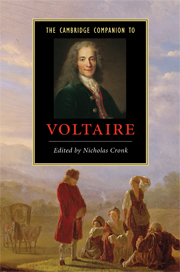Book contents
- Frontmatter
- Introduction
- 1 The making of a name: a life of Voltaire
- 2 Voltaire and authorship
- 3 Voltaire: philosopher or philosophe?
- 4 Voltaire and clandestine manuscripts
- 5 Voltaire and the myth of England
- 6 Voltaire’s masks: theatre and theatricality
- 7 Voltaire as story-teller
- 8 Candide
- 9 Voltaire and history
- 10 Voltaire’s correspondence
- 11 Voltaire: pamphlets and polemic
- 12 Voltaire and the politics of toleration
- 13 Voltaire and the Bible
- 14 The Voltaire effect
- Further reading
- Index
4 - Voltaire and clandestine manuscripts
Published online by Cambridge University Press: 28 May 2009
- Frontmatter
- Introduction
- 1 The making of a name: a life of Voltaire
- 2 Voltaire and authorship
- 3 Voltaire: philosopher or philosophe?
- 4 Voltaire and clandestine manuscripts
- 5 Voltaire and the myth of England
- 6 Voltaire’s masks: theatre and theatricality
- 7 Voltaire as story-teller
- 8 Candide
- 9 Voltaire and history
- 10 Voltaire’s correspondence
- 11 Voltaire: pamphlets and polemic
- 12 Voltaire and the politics of toleration
- 13 Voltaire and the Bible
- 14 The Voltaire effect
- Further reading
- Index
Summary
The importance of clandestine manuscripts in the diffusion of early Enlightenment thought was first suggested by Gustave Lanson at the beginning of the twentieth century. Ira Wade's classic study The Clandestine Organization and Diffusion of Philosophical Ideas in France from 1700 to 1750 (1938) marked a decisive advance in our understanding of this phenomenon, and since then this area has become a major focus of Enlightenment research. Radical ideas about religious belief circulated from the second half of the seventeenth century, very often in manuscript form, and after 1700 these works either found their way into print or influenced other printed works. We think of Voltaire primarily as an actor in the world of the printed book; but to fully understand the nature and sources of his polemical thought, we need also to study his familiarity with the culture of clandestine manuscripts and their influence on the production of his own books and pamphlets.
Voltaire believed, unlike Fontenelle, that it was the duty of the philosophes to teach the truth. From early on, he taught by example. In April 1726, a certain Abbé accused Voltaire of having preached for a good ten years or more 'naked deism in the boudoirs of our young gentlemen' ('le déisme tout à découvert, aux toilettes de nos jeunes seigneurs'), and of declaring himself an 'enemy of J. C.' ('ennemi de J.-C.'). Voltaire had already begun at this date to compose works in verse and prose destined for private reading and for circulation in manuscript. Later, his library as well as his own writings reflect his familiarity with the manuscript works which circulated clandestinely.
- Type
- Chapter
- Information
- The Cambridge Companion to Voltaire , pp. 65 - 78Publisher: Cambridge University PressPrint publication year: 2009
- 3
- Cited by

